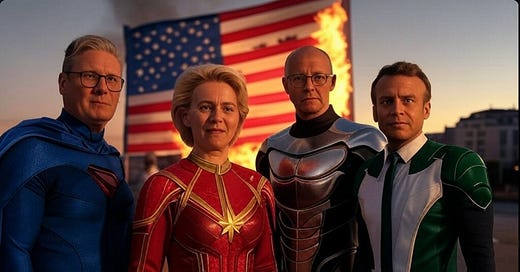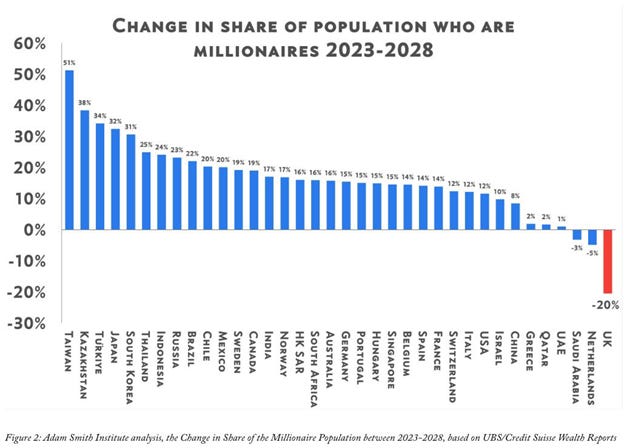EU and UK Lash Out at Trump as Their Global Power Fades
Once pillars of the Western “Regime,” the EU and UK are floundering after Trump saws off the Washington leg of their three-legged alliance—leaving room for Xi and MAGA to reshape the world order.

The U.K. and Germany want their citizens to know: do not travel to the United States. Both governments issued warnings this week, brows furrowed and voices somber. It’s too dangerous, they say. Immigrants are being deported left and right.
Meanwhile, The Guardian’s own Jonathan Freedland went full tilt on Friday, displaying classic symptoms of Trump Derangement Syndrome. According to him, the Western world must break ties with the United States—with Britain leading the way. Under Trump, he warns, the U.S. is no longer an ally. It is run by extremists.
“The evidence that the U.S. is moving, even galloping, away from basic notions of democracy and freedom is piling up. Just because the changes have happened so fast doesn’t make them any less fundamental. We now have a U.S. administration that blithely ignores court rulings, whose officials say out loud ‘I don’t care what the judges think.’ In a matter of weeks, it has become an open question whether the U.S. remains a society governed by the rule of law.” — Freedland, The Guardian, March 21
Freedland is either unaware of how the American courts have treated Trump over the last eight years—or he’s pretending not to know, in hopes of persuading his bright, reasonable British readers to his side. I’m not sure which it is.
Over the last two months, we’ve watched Trump break the Holy Trinity of the Western regime. His administration has staged a successful coup against the Washington wing of that alliance, and now the European wing is lashing out in opposition. The problem? Europe’s effete leadership is too accustomed to performative gestures. They are not leaders of men and women—they are like tenured humanities professors, guided in part by the views of hyper-emotional sophomore activists on campus.
Their anger at Trump stems from his disruption of the Western deep state, of which they are a part and owe their daily bread. He not only exposed that state within a state—he and his supporters are mocking it. Europe’s elites fear their turn is next. It is.
Ukraine is the Wedge
Trump wants to end the war in Ukraine. He belongs to the old-school realist foreign policy tradition—one that sees the world as it is, not as we wish it to be. And on the ground in Ukraine, that likely means the loss of Crimea at a minimum, and probably the Donbas as well. That’s what happens when you lose a war: your country gets divided. See East and West Germany, for example.
The Europeans want a seat at the table to negotiate peace. But that’s a terrible idea. They already had the seat, the table, and the entire room back in Minsk, Belarus in 2015—and they blew it.
Now, instead of results, they return to their greatest hits: vague invocations of “democracy” and ominous warnings about a coming “Russian war in Europe.” These are their clarion calls to justify continued support for Ukraine.
In February, they unironically came up with this group called Weimar+. It’s basically just another Western leadership “memorandum of understanding”.
This is it.
There will be no territorial integrity. Not now. Maybe not ever. I do not cheer this fact, but there is a minus 100 chance that Vladimir Putin gives back Crimea. I would be shocked if he gives back Donbas, even with major concessions from Washington and Kiev. Why should Moscow trust them, anyway? If you find an analyst saying Russia will give it all back, including Crimea, go back and see how many times they said Russia’s days were numbered in this war (and were wrong).
Europe is the Past
It is tiresome to keep hearing the same lines from the Europeans, and many leftists in the U.S., of course, to define their opposition. It is always the same worldview: the lens is the World War II fight between the nationalists/fascists and the communists. The Nazis are bad. The Russians are bad. The Antifa of that era were communists and supported the Russians. Today, they have Ukraine flags in their social media bios. None of it makes any sense.
Western Europe and the U.S. post-war believed only an open society free of nationalist passions could stop the Europeans from killing each other. It lasted for nearly two generations.
But the rise of China and other emerging market powers have ended the West’s unipolar, open society model, which was policed by the U.S., and very beneficial to Europe because they didn’t have to pay for the regime’s empire. Today, Trump and many others have succumbed to the fact that we live in a multipolar world. Europe doesn’t like the U.S. recoiling from this view. It demands the U.S. be active in it once more, which means the constant threat of war with the Russians and beating up on the home grown opposition as the Nazis. A broken record. Why can’t they just move on?
“The European leadership is not concerned about the people of Europe; they’re concerned about their talking points — the ‘rules based order’, the warnings about the Russians wanting a war with them. But I don’t see how any of these people are in control of Europe’s destiny at the moment,” says Vladimir Signorelli of Bretton Woods Research. “In Germany, despite Frederick Merz getting the second lowest vote total since World War II, he is in going to be in charge of the country. If I’m a big corporation, am I putting money to work in Germany? No. I’m investing in China, or in Mexico or the United States. I wouldn’t invest in Western Europe. It’s biggest, most influential leaders, do not have a clue that the world is moving on,” Signorelli says.
We live in the post-globalist West. European leaders are still fighting the fascists and the communists and “trying to preserve democracy and freedom,” all the while acting like totalitarians by silencing those who oppose them at home. The gaslighting has not gone unnoticed by anyone. Sadly, they think it has.
For Europe the direction is clear at the moment: it’s all downhill from here.
In CDU-SPD-Groen Party run Germany, deindustrialization continues:
Meanwhile, back at the ranch, German deindustrialization is good for us!
“Selbst du, Volkswagen!?”
Volkswagen (Hitler’s car company! See what I did there…?) said it will lay off tens of thousands and close three plants. They’re saving money on European labor, and spending it in China.
Last April, Volkswagen announced a $2.7 billion investment in China to make new EVs with its Chinese partner XPENG.
Volkswagen’s CFO Arno Antlitz said at the World Economic Forum this January that despite all of the manufacturing money going to Mexico and Canada to gain duty free access to the U.S., “We need additional initiatives to double market share; we have to be even more local.”
I think China is the main play here for VW as their Chatanooga plant is currently in a dispute with labor unions.
Mercedes Benz is shrinking in Europe, hiring and investing in China.
In September 2024, Mercedes-Benz announced plans to invest around $1.97 billion to manufacture new and existing cars and vans, primarily for the China market.

Europe has reason to be worried.
It should be worried that the U.S.-led Western regime is being dismantled, or so Trump and his team have told them. It should be worried that it can barely survive without the U.S. and China. It should be worried that its biggest corporations are investing more in “undemocratic” and “extremist” countries than in the kumbaya, love is love nations back home.
China is attracting Europe’s industrial capital—and the U.S. is next in line to benefit with giants like Siemens expanding investments here.
European demographics are in decline. And its policy obsessions—climate change, open borders, and 21 genders—have arguably been divisive and ruinous.
Last year, former ECB president Mario Draghi published a report titled “The Future of European Competitiveness.” In it, he warned that China and Washington’s new approach to trade pose major headwinds for Europe’s economic model. I don’t see anyone in Europe addressing this. Instead, they spend more time holding conferences about Ukraine, as if the war is marching toward Poland, and—as always, in their nostalgic obsession with the 1940s—the Russians are poised to bring chaos to Germany once again.
It’s all so tired. And so is Europe.
Nice food and charming medieval seaside villages, though.









